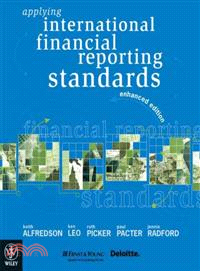APPLY INTERNATIONAL FINANCIAL REPORTS ENH
商品資訊
ISBN13:9780470808238
出版社:JOHN WILEY & SONS;LTD
作者:Keith Alfredson; Ken Leo; Ruth Picker; Paul Pacter; Jennie Radford
出版日:2006/12/07
裝訂/頁數:平裝/1256頁
定價
:NT$ 4558 元優惠價
:90 折 4102 元
若需訂購本書,請電洽客服 02-25006600[分機130、131]。
商品簡介
目次
相關商品
商品簡介
Applying International Financial Reporting Standards (Enhanced Edition) contains a number of content revisions as a consequence of various adjustments made to IFRS since their inception in January 2005. Students are required to possess a sound understanding of the financial reporting requirements under IFRS and this textbook remains the only educational resource available to meet student needs. The new enhanced edition will continue to offer students a thorough conceptual overview and practical working knowledge of the financial reporting requirements required under IFRS.
The core focus of the text remains on the interpretation, analysis, illustration and application of the scope and purpose of the financial reporting processes under IFRS. The financial reporting environment has changed considerably over the past 2 years, since the introduction of international accounting standards, and is expected to continue changing for another 3-5 years. The objective of the author team is to ensure that the textbook continues to be up-to-date in accordance with IFRS revisions initiated by the IASB.
This textbook has been written for intermediate and advance financial reporting courses, at both undergraduate and postgraduate level, and aligns with the knowledge expectations of the accounting profession.
* New chapter on Revenue Recognition explores the recognition and measurement of revenues for goods, services rendered and dividends
* New chapter on IFRS 2 Share-based Payment examines the scope for recognising and measuring share-based payment transactions
* New extracts from real world companies included to enable students to apply the intention of the Standard as well illustrate how the Standard translates to the reporting environment.
* International Financial Reporting Standards in the edition include:
* Framework for the preparation and presentation of financial statements
* IFRS 1 First-time adoption of International Financial Reporting Standards
* IFRS 2 Shared based payments
* IFRS 3 Business combinations
* IFRS 5 Non-current assets held for sale and discontinued operations
* IAS 1 Presentation of financial statements
* IAS 2 Inventories
* IAS 7 Cash flow statements
* IAS 8 Accounting policies; changes in accounting estimates and errors
* IAS 10 Events after balance sheet date
* IAS 12 Income taxes
* IAS 14 Segment reporting
* IAS 16 Property, plant and equipment
* IAS 17 Leases
* IAS 18 Revenue
* IAS 27 Consolidated and separate financial statements
* IAS 28 Investments in associates
* IAS 31 Interests in joint ventures
* IAS 32 Financial instruments; disclosure and presentation
* IAS 36 Impairment of assets
* IAS 37 Provisions, contingent liabilities and contingent assets
* IAS 39 Financial instruments; recognition and measurement
* Step by step analysis of the IFRS, its scope, objectives and reporting requirements
* Details the relevant issues and practical workings associated with the selected IFRS
* Illustrative examples positioned throughout the chapters show the new financial reporting procedures and further develop conceptual understanding of the new processes
* Chapters include extracts of international companies to illustrate how real companies are reporting financial data in accordance with the IFRS
* Graded end-of-chapter exercises and problems provide students with numerous opportunities to test their understanding of the financial reporting requirements under the respective standard. For the lecturer, a comprehensive solutions manual provides guidance on the correct procedures for working through the activities.
The core focus of the text remains on the interpretation, analysis, illustration and application of the scope and purpose of the financial reporting processes under IFRS. The financial reporting environment has changed considerably over the past 2 years, since the introduction of international accounting standards, and is expected to continue changing for another 3-5 years. The objective of the author team is to ensure that the textbook continues to be up-to-date in accordance with IFRS revisions initiated by the IASB.
This textbook has been written for intermediate and advance financial reporting courses, at both undergraduate and postgraduate level, and aligns with the knowledge expectations of the accounting profession.
* New chapter on Revenue Recognition explores the recognition and measurement of revenues for goods, services rendered and dividends
* New chapter on IFRS 2 Share-based Payment examines the scope for recognising and measuring share-based payment transactions
* New extracts from real world companies included to enable students to apply the intention of the Standard as well illustrate how the Standard translates to the reporting environment.
* International Financial Reporting Standards in the edition include:
* Framework for the preparation and presentation of financial statements
* IFRS 1 First-time adoption of International Financial Reporting Standards
* IFRS 2 Shared based payments
* IFRS 3 Business combinations
* IFRS 5 Non-current assets held for sale and discontinued operations
* IAS 1 Presentation of financial statements
* IAS 2 Inventories
* IAS 7 Cash flow statements
* IAS 8 Accounting policies; changes in accounting estimates and errors
* IAS 10 Events after balance sheet date
* IAS 12 Income taxes
* IAS 14 Segment reporting
* IAS 16 Property, plant and equipment
* IAS 17 Leases
* IAS 18 Revenue
* IAS 27 Consolidated and separate financial statements
* IAS 28 Investments in associates
* IAS 31 Interests in joint ventures
* IAS 32 Financial instruments; disclosure and presentation
* IAS 36 Impairment of assets
* IAS 37 Provisions, contingent liabilities and contingent assets
* IAS 39 Financial instruments; recognition and measurement
* Step by step analysis of the IFRS, its scope, objectives and reporting requirements
* Details the relevant issues and practical workings associated with the selected IFRS
* Illustrative examples positioned throughout the chapters show the new financial reporting procedures and further develop conceptual understanding of the new processes
* Chapters include extracts of international companies to illustrate how real companies are reporting financial data in accordance with the IFRS
* Graded end-of-chapter exercises and problems provide students with numerous opportunities to test their understanding of the financial reporting requirements under the respective standard. For the lecturer, a comprehensive solutions manual provides guidance on the correct procedures for working through the activities.
目次
Part 1 Framework
Chapter 1: The IASB: history, current structure and processes
Chapter 2: The conceptual Framework of the IASB
Part 2 Elements
Chapter 3: Contributed equity: capital, reserves and accumulated profits
Chapter 4: Revenue Recognition Chapter 5: Provisions and contingencies
Chapter 6: Financial instruments
Chapter 7: Share based payments
Chapter 8: Income tax Chapter 9: Inventories
Chapter 10: Property, plant and equipment Chapter 11: Intangible assets
Chapter 12: Business combinations
Chapter 13: Impairment of assets Chapter 14: Leases
Part 3 Disclosure
Chapter 15 Principles of disclosure
Chapter 16: Presentation of financial statements
Chapter 15: Cash flow statements Chapter 18: Segment reporting
Part 4 Economic entities
Chapter 19: The nature of economic entities
Chapter 20: Consolidated financial statements: wholly owned subsidiaries
Chapter 21: Consolidated financial statements - inter-entity transactions Chapter 22: Consolidated financial statements - minority interest
Chapter 23: Consolidated financial statements - indirect ownership interests
Chapter 24: Consolidated financial statements - foreign currency translation
Chapter 25: Accounting for investments in associates
Chapter 26: Interests in joint ventures
Chapter 1: The IASB: history, current structure and processes
Chapter 2: The conceptual Framework of the IASB
Part 2 Elements
Chapter 3: Contributed equity: capital, reserves and accumulated profits
Chapter 4: Revenue Recognition Chapter 5: Provisions and contingencies
Chapter 6: Financial instruments
Chapter 7: Share based payments
Chapter 8: Income tax Chapter 9: Inventories
Chapter 10: Property, plant and equipment Chapter 11: Intangible assets
Chapter 12: Business combinations
Chapter 13: Impairment of assets Chapter 14: Leases
Part 3 Disclosure
Chapter 15 Principles of disclosure
Chapter 16: Presentation of financial statements
Chapter 15: Cash flow statements Chapter 18: Segment reporting
Part 4 Economic entities
Chapter 19: The nature of economic entities
Chapter 20: Consolidated financial statements: wholly owned subsidiaries
Chapter 21: Consolidated financial statements - inter-entity transactions Chapter 22: Consolidated financial statements - minority interest
Chapter 23: Consolidated financial statements - indirect ownership interests
Chapter 24: Consolidated financial statements - foreign currency translation
Chapter 25: Accounting for investments in associates
Chapter 26: Interests in joint ventures
主題書展
更多
主題書展
更多書展今日66折
您曾經瀏覽過的商品
購物須知
外文書商品之書封,為出版社提供之樣本。實際出貨商品,以出版社所提供之現有版本為主。部份書籍,因出版社供應狀況特殊,匯率將依實際狀況做調整。
無庫存之商品,在您完成訂單程序之後,將以空運的方式為你下單調貨。為了縮短等待的時間,建議您將外文書與其他商品分開下單,以獲得最快的取貨速度,平均調貨時間為1~2個月。
為了保護您的權益,「三民網路書店」提供會員七日商品鑑賞期(收到商品為起始日)。
若要辦理退貨,請在商品鑑賞期內寄回,且商品必須是全新狀態與完整包裝(商品、附件、發票、隨貨贈品等)否則恕不接受退貨。
























